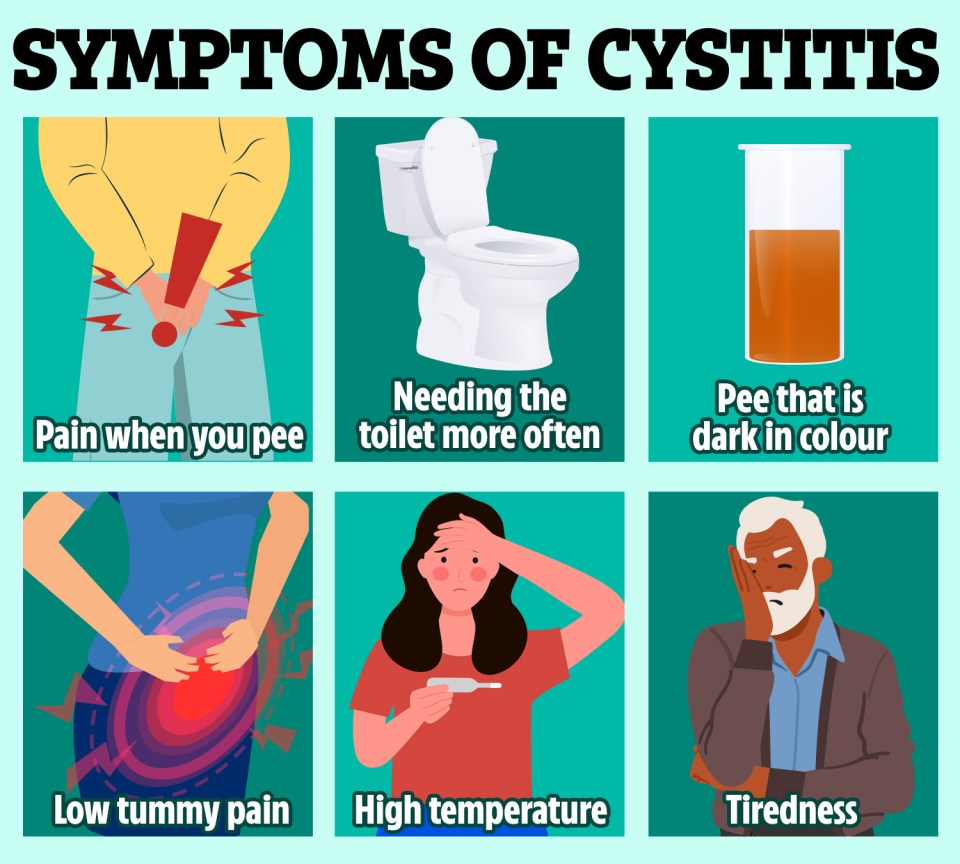BLADDER infections in middle-age might be a sign of cancer, doctors warn.
Urinary tract infections, or UTIs, are common and usually harmless but could signal more sinister illness in some patients.
A study of 3.5million people found over-50s diagnosed with cystitis had higher than average tumour rates.
Cystitis is most common in women, affecting half at some point in their life, and about one in seven men.
Symptoms may include burning or stinging when you pee, needing the toilet more urgently and tummy pain.
The research by Lund University in Sweden found patients diagnosed with cystitis were up to thirty times more likely to be diagnosed with cancer in the next three months.
Overall men diagnosed with cystitis were 34 times more likely to discover urogenital cancer in their bladder or prostate.
Women had a 30 times higher risk of urogenital cancers, including of the bladder, and were also more likely to discover womb cancers.
The elevated risk fell as more time passed after the infection but remained higher than in people who did not have cystitis.
Cancer damage may weaken infection defence
Writing in the journal BMJ Health, the study authors said: “This adds to the accumulating evidence for infections as markers of increased cancer risk.
“The findings indicate that acute cystitis could be a clinical marker for urogenital cancer, at least when no other cause is obvious.
“The risks for cancers were highest within three months of cystitis diagnosis.
/br
“It is plausible that urogenital cancer, and perhaps even pre-cancerous changes, might increase the risk of cystitis because of compromised urinary tract and defence.”
Tens of thousands of Brits are diagnosed with cancers below the belt every year.
More than 10,000 people develop bladder cancer, around 10,000 women get womb cancer and prostate tumours are the most common type among men, with 55,000 yearly cases.
Most urinary tract infections are not related to cancer and clear up on their own or with a short course of antibiotics.
What is a UTI?
Urinary tract infections (UTIs) are usually caused by E.coli bacteria – found in poo – entering the urinary tract.
The bacteria enter through the tube that carries pee out of the body (urethra).
Women are more likely than men to pick up UTIs as they have a shorter urethra than men.
This means bacteria are more likely to reach the bladder or kidneys and cause an infection.
According to the NHS, things that increase the risk of bacteria getting into the bladder include:
- Having sex
- Pregnancy
- Conditions that block the urinary tract – such as kidney stones
- conditions that make it difficult to fully empty the bladder – such as an enlarged prostate in men and constipation in children
- Urinary catheters (a tube in your bladder used to drain urine)
- Having a weakened immune system – for example, people with diabetes or people having chemotherapy
- Not drinking enough fluids
- Not keeping the genital area clean and dry
Check if it’s a UTI
Symptoms of a urinary tract infection (UTI) may include:
- Pain or a burning sensation when peeing (dysuria)
- Needing to pee more often than usual
- Needing to pee more often than usual during the night (nocturia)
- Needing to pee suddenly or more urgently than usual
- Pee that looks cloudy
- Blood in your pee
- Lower tummy pain or pain in your back, just under the ribs
- A high temperature, or feeling hot and shivery
- A very low temperature below 36C
Your pee may also be dark or smell. If this is your only symptom, it might be because you’ve not been drinking enough water.
What to do if you think you have a UTI
If you think you have UTI symptoms, you should speak to your GP to discuss treatment options.
Most people will need antibiotics.
Some people may be prescribed a ‘delayed antibiotic’, meaning they’ll be asked only to use it if their symptoms don’t go away after a certain amount of time.
If you keep getting UTIs, your GP might recommend you have a low dose of antibiotics over a long period of time or refer you to a specialist for more tests and treatments.
For women who have gone through menopause, there is evidence that vaginal oestrogen creams can reduce UTI symptoms.
Source: NHS













